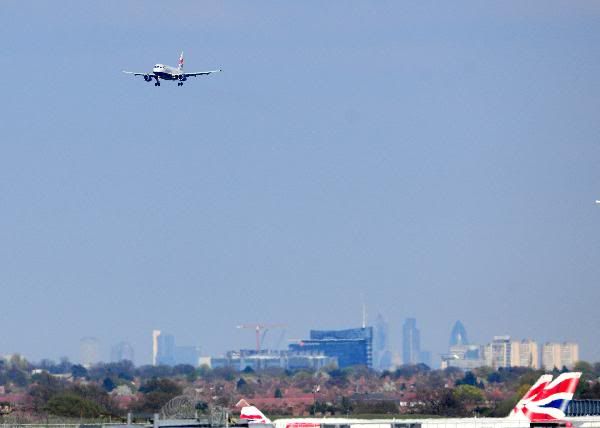
An airplane of British Airways is about to land at the Heathrow Airport in London, capital of Britain, April 21, 2010. The British authority reopened its airspace from 10:00 p.m. on Tuesday, which had been shut down since April 15 owing to the influence of volcanic ash from Iceland.
Europe's airspace is now quickly returning to normal business as about 80 percent of scheduled flights took off Wednesday and 100 percent expected for Thursday.
With the Icelandic volcano at the source of this historic travel disruptions losing its fury, scientists now foresee no major chaos like this current one in the near future, although long, small disruptions are still very likely to occur.
All Europe's main air hubs were up and running Wednesday and the European air traffic agency Eurocontrol said it expected some 21,000 flights in European airspace, against a typical 28,000 on a normal day, or more than three-quarters of the full volume to have taken off that day.
The agency predicted normal traffic on Thursday. "It is anticipated that almost 100 percent of the air traffic will take place in Europe tomorrow, Thursday April 22," it said in a statement.
In Europe's far north, Helsinki in Finland and airspace over the remote Scottish isles of Orkney and Shetland were temporarily reclosed due to still unsafe ash levels. But Iceland's other Nordic neighbors, Denmark, Norway and Sweden, have lifted the last of their restrictions.
While airlines are now scrambling to ship millions of stranded passengers to their destinations, recriminations have begun to fly over whether the week-long shutdown was necessary, which caused the worst traffic chaos in Europe since World War Two.
Overall damage to the global airline industry has reached 1.7 billion U.S. dollars since governments closed their airspace on April 14, according to the International Air Traffic Association.
Airline chiefs have fiercely criticized Europe's chaotic response to the volcanic ash cloud, saying the decisions were based on flawed data or unsubstantiated fears. An aviation group called the financial fallout worse than the three-day worldwide shutdown after the 2001 terrorist attacks in the United States.
European governments "must take their responsibility" and help the carriers, said IATA chief Giovanni Bisignani. Now governments needed to look at how to compensate the airlines, he said.
Some scientists have defended the airspace shutdown, with a volcanologist advising the United Nations saying authorities had no choice but to close their airspace for lack of hard facts about aircraft behavior in volcanic ash.
Closure to air traffic "was the only measure that could be taken", said Henry Gaudru, president of the European Volcanological Society.
The economic impact of the cloud has already hit parts of the supply chain and could potentially dent the fragile recovery from the global recession, experts say.
Pricewaterhouse Coopers said a week of disruption could destroy 0.025-0.05 percent of annual British gross domestic product. The same could be true of other European countries, though Germany said the effect on its economy would be limited.
But there is also saying that the disaster causes no significant loss of total economic output. Although several industries such as airlines were hit hard, they could now recoup part of their losses, for example by staging extra flights.
During the disruption, some economic activity simply moved from one sector to another; road and rail transport in many areas increased at the expense of air travel, it is argued.
To the extent that the disruption exposed weaknesses in companies' distribution systems and fall-back plans, it could now prompt fresh investment, which might actually be positive for economic growth.
Travel and tourism, including transport, lodgings and related investment, comprise about 4 percent of West European gross domestic product, according to the World Travel and Tourism Council.
But while hotels received fewer incoming tourists, some were able to raise their prices to take advantage of stranded tourists, media reports quoted economists as saying.
Meanwhile, Iceland has reported only an "insignificant" amount of ash erupting from the Eyjafjoell volcano now, and with scientists and manufacturers having downgraded the risk of flying in areas of relatively low concentrations, it is predicted as unlikely that any future disruptions will be as serious.
"Explosive activity has diminished. Ash production has gone down. It's really insignificant right now," Pall Einarsson from Iceland's Institute of Earth Sciences told reporters at the government's Civil Protection Agency.
However, Einarsson stressed that the volcano continues to erupt and is unpredictable, foreseeing long-lasting eruptions which may cause small- scale fresh air traffic disruptions.






0 comments:
Post a Comment